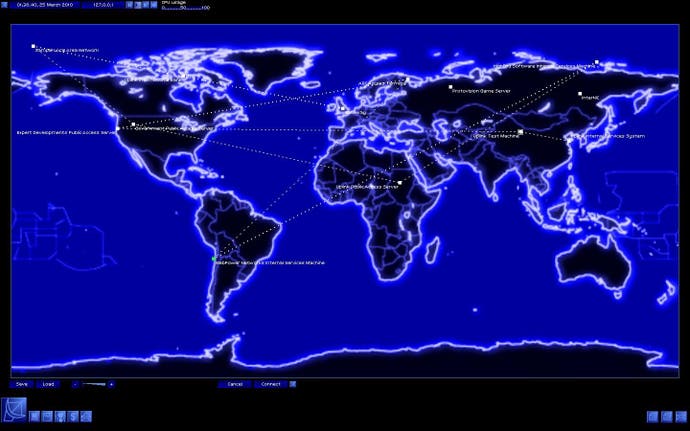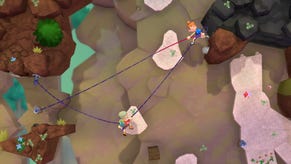Retrospective: Uplink
Beep boop beep ba beep bo boop ba beep.
Come with me now, as we attempt to picture the year 2010. Let your mind stretch out and attempt to perceive the thrill, the technological adventure. What manner of life will we be living? And most importantly, what sort of computers will we be working with?
Uplink disappointingly fails to get it embarrassingly wrong. The nine-year-old game was set in 2010, and ideally you want something created in 2001 to have made sweet predictions of machines coming with over a gigabyte of RAM, or similar. Instead, well, they either wildly over-estimated or got it pretty spot on.
Uplink was - and very much still is thanks to its simplicity and ageless design - a hacking game. You play a bedroom cracker, burrowing your way into multiple computers for cash payment. With money comes the ability to purchase better equipment, and with better equipment comes the ability to complete more complex hacks.
This is a time when gateway computers would be able to handle as many as eight CPUs. Which is, um, pretty accurate. What's slightly less accurate is Introversion's optimism that by now they'd be running at 200GHz. I'd like me one of those 200Gig Octo-cores very much. I'm also not entirely clear what a Gq is, and therefore can't figure out if 32Gq of RAM is good. But it seems fairly unsilly, overall. (I'm sure people in the comments will point out how much I've arsed this up.)
The presentation, while peculiarly spaced out and in teeny text at current resolutions (didn't predict those eh, Introversion?!), was already harking back to a classic design a decade ago. Simple, elegant text, a basic world-map interface for establishing your connections, and little else to trouble your machine. In fact, the full download of the game via Steam is 14MB. And most of that is sound files.

Introversion have always been developers of extraordinary economy. Darwinia, famously, had to be given an enormous opening movie file so people installing it didn't think it hadn't worked. They're a team who have to fake progress bars for our own comfort. With Uplink you have a game that would rattle around on a free USB stick from five years ago. Heck, take out the sound and it would fit on a couple of floppy discs. Size is certainly not everything.
What's so fun about it is how it makes no qualms about entertaining that same part of your brain that was thrilled in every eighties movie as the blur of blinking text scrolled down the screen, eventually allowing the angelic-faced teenager to download the FBI's most important files. All that fun is in place.
But most of all, Uplink is a game about chase sequences.
You dial up to the main Uplink server, and check the mission list. Here will be available jobs for ne'er-do-wells like you to take on, beginning asking you to complete basked tasks such as stealing a file from a server, or changing someone's academic records.
Then, should you progress, the tasks get tougher. Fiddling with criminal records, transferring funds, destroying computers, framing people, and ruining lives. Each new task requires new tech, with a learning curve that easily has you running multiple systems simultaneously, without feeling overwhelmed. By the time you need to get around a proxy server, all those tasks like trace trackers and password hackers will seem like background details, instinctively run.











